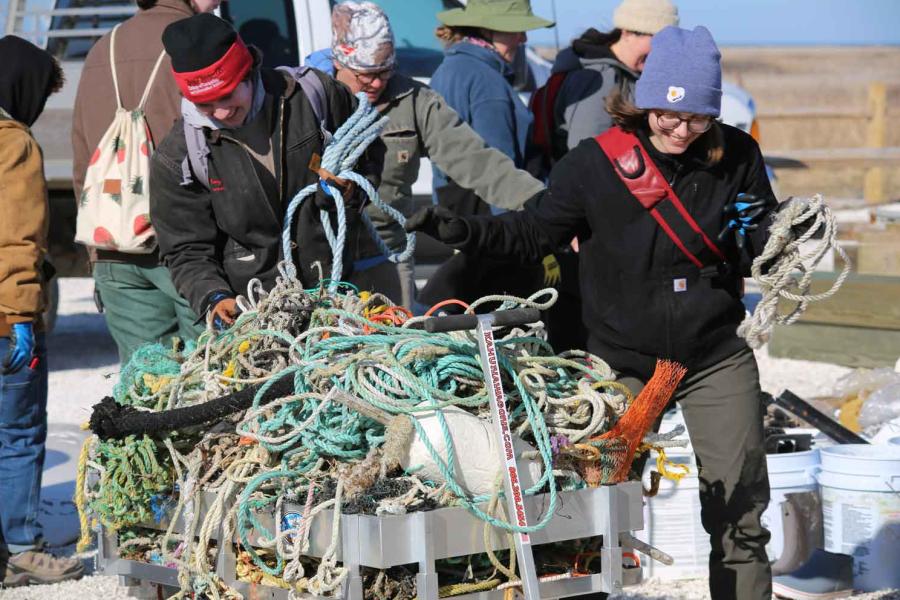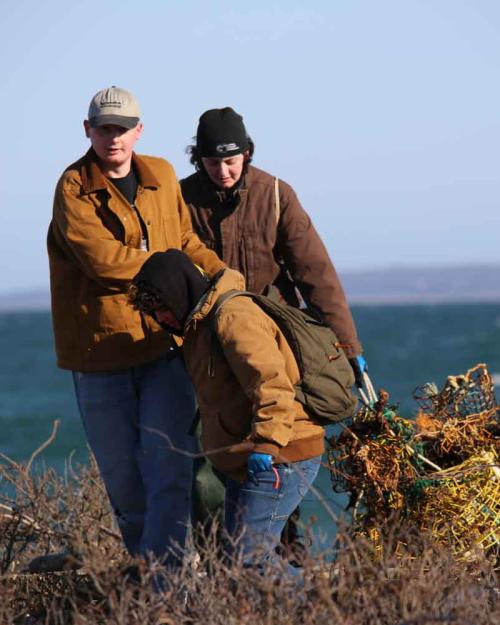Isaac Newcomb ’23 spent his spring break on a Massachusetts island, dismantling hundreds of discarded lobster traps, collecting sounds of the island and deepening his understanding of human impacts on marine life.
“I gained a visceral understanding of the waste that lingers in the ocean, found a community determined to enact change and captured an indescribable feeling through the sounds of the island,” said Newcomb, a mechanical engineering major in Cornell Engineering. “Now I’m ready to dissect and organize those elements, much like we sorted through lobster traps and trash, to create a song that never would’ve existed without this trip.”
Newcomb and 13 other students were part of the Music on the Brain Field Study class, led by Annie Lewandowski, a senior lecturer in music in the College of Arts and Sciences. They trekked to Cuttyhunk Island to join a group of conservationists, artists and island residents to clean up traps and other fishing gear that had been abandoned, lost or otherwise discarded – known as “ghost gear” – and washed up on the island’s shores. The project was funded in part by the Einhorn Center Engaged Opportunity Grant.
“This trip connects what we are learning in class about acoustic communication in whales to anthropogenic impacts on marine animals and their habitats,” said Lewandowski, who’s been fascinated with whales since she was a child and is working on a second graduate degree in conservation biology. “It was incredibly rewarding seeing these students engage with the materials, with island residents and reckoning with the scope of the ghost-gear problem.”
Students spent their days digging out lobster traps, rope and other items from the rocky shoreline, gathering the debris in a centralized area, then documenting, sorting and loading it into containers to be hauled off-island for disposal or recycling.
In the evenings, students learned about issues impacting marine conservation efforts and creative responses to ghost gear through nightly lectures including by Laura Ludwig, marine debris and plastics program coordinator for the Center for Coastal Studies in Provincetown, Mass., who spearheaded the Cuttyhunk project. Now that they’ve returned, students are creating multimedia web-based projects responding to their experiences.
“It was such a unique experience to see firsthand how the fishing and lobster industries negatively affect the oceans and people living on the coast,” said Lindsey Manos ’23, an information science major. “I’m filled with a renewed passion for protecting the environment and being a more ethical consumer.”
Ludwig used ID tags to identify the age and owner of 250 of the more than 500 traps processed; the data will contribute to a regional prioritization of issues as part of the developing Southern New England Marine Debris Action Plan.
“Key to the success of this island shoreline data and debris collection effort was a vested group of volunteers who were prepared for the rigors of such a monumental task,” Ludwig said. “As the field work evolved over the course of a week, individual strengths revealed themselves and each student found a role which suited their unique abilities. Students seized the data for input and analysis, greeted mundane tasks with enthusiasm, and immediately understood and mastered specialized equipment.”
Lewandowski said she and Ludwig are already talking about building on this year’s work for another trip in 2024.
This story also appeared in The Cornell Chronicle.





